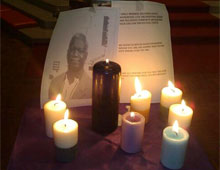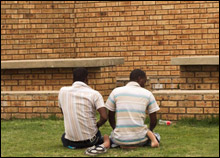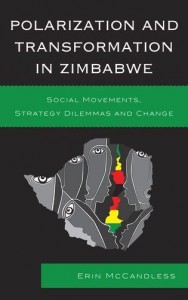
Cover: Polarization and Transformation: Social Movements, Strategy Dilemmas and Change
By Erin McCandless – Erin McCandless consults with the United Nations on a range of peacebuilding, statebuilding and development issues, and teaches part-time at the Graduate Program for International Affairs at the New School, in New York. She is also Co-Executive Editor of the Journal of Peacebuilding and Development.
Introduction
It is common and understandable for people living in divided or developing countries to tire of international researchers coming to examine their plight, observing their situation from particular disciplinary and/or experiential lenses, often rapidly assessing the situation after a short period in the country and after speaking with a limited number of people. They often don’t share the fruits of their labour with the society that hosted them.
Having lived in Zimbabwe (January 2001-June 2004) where I conducted my doctoral field research, followed by numerous trips back to the region in the years that have followed, I am finally publishing a book. I am guilty of taking a long time in sharing findings; like most doctoral students, I had to make a living in the interim and the book was put on the back burner. But my belief in the importance of these issues that drove my research ensured that I kept coming back to Zimbabwe.[1] In this short paper I want to present some of the findings of my forthcoming book – Polarization and Transformation: Social Movements, Strategy Dilemmas and Change. I also want to share my motives and assumptions that drove the research, and my thoughts on why I think Zimbabwe’s challenges matter greatly to a larger international audience, beyond the powerful forces focused on regime change. (Read more…)
Wed, April 20 2011 » Zimbabwe Review » 5 Comments

Zimbabwe lawyers fail to gain access to their clients, accused of treason: Harare High Court, February 2011.
Since the signing and initiation of the Global Political Agreement in Zimbabwe in September 2008 and February 2009 respectively, the politics of the country has been convulsed with a recurring set of problems even as it has allowed for a certain political and economic stabilization. The agreement, with its attendant Inclusive Government, was set up to establish the conditions for a free and fair election. However it was always clear that, in a more determinate sense, it would provide the site for intense struggles over the state between the contending parties, with Zanu PF always in an advantageous position because of its control of the coercive arms of the state. It is thus not surprising that the Mugabe regime has used its control of the police, security and military sectors to contain the constrained promise of the GPA to open up democratic spaces. It is also clear that both MDCs have made strategic mistakes that have added to the already difficult challenges that confronted them at the outset of the process. Moreover the problems of the GPA have, on occasion, been compounded by the different roles of SADC and the West. (Read more…)
Wed, April 13 2011 » Global Political Agreement, Reports » 1 Comment
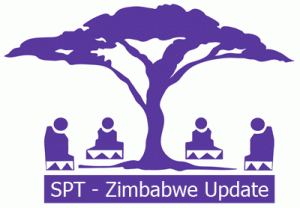 Over the last few days, I have watched, listened to, and read with growing horror and dismay, about events unfolding in Mount Darwin, Zimbabwe, where human remains are currently being hauled out of mine shafts by completely unqualified individuals. I have examined with great sadness, photographs of dishevelled piles of skulls, long bones and other indiscriminately exhumed human remains.
Over the last few days, I have watched, listened to, and read with growing horror and dismay, about events unfolding in Mount Darwin, Zimbabwe, where human remains are currently being hauled out of mine shafts by completely unqualified individuals. I have examined with great sadness, photographs of dishevelled piles of skulls, long bones and other indiscriminately exhumed human remains.
There are 206 bones in each human body – each hand has 27 bones and each foot has 26, meaning half of our bones are in our hands and feet – does the average war veteran currently hurling around the dead in Mount Darwin know this, or care? What is happening to all those delicate wrist and hand bones, in the chaos that is going on?
Does the average Mount Darwin exhumer understand that in order to age, or sex, a set of human remains, they need to be complete – an expert will consider various indicators on a human skull, pelvis, long bones and a particular rib, before drawing a probable conclusion on whether the deceased is male, or female, and 18 years or 65 years old. Knowing that the majority of people in a particular site are of a certain age and sex, for example, could help unravel the circumstances of their deaths. But this opportunity has already been largely taken away by the fact that it is not possible to be sure which bones make up which person at this stage. (Read more…)
Thu, March 24 2011 » Conflict resolution, History, Human rights, Zimbabwe Update » 1 Comment
 Given the economic and political convulsions that have marked Zimbabwean politics for the last decade, it is not surprising that the momentous events in North Africa have been imported and constructed in contested ways by the major political players in Zimbabwe. With the Zimbabwean landscape torn by the polemical rupture between the redistributive language of the ruling party Zanu PF that has monopolized the legacy of the liberation struggle, and the opposition MDCs and civic movement that were formatively shaped by the politics of human rights and constitutionalism from the 1990’s, the complex events of the Maghreb have resonated differently within Zimbabwe.
Given the economic and political convulsions that have marked Zimbabwean politics for the last decade, it is not surprising that the momentous events in North Africa have been imported and constructed in contested ways by the major political players in Zimbabwe. With the Zimbabwean landscape torn by the polemical rupture between the redistributive language of the ruling party Zanu PF that has monopolized the legacy of the liberation struggle, and the opposition MDCs and civic movement that were formatively shaped by the politics of human rights and constitutionalism from the 1990’s, the complex events of the Maghreb have resonated differently within Zimbabwe.
Mugabe’s Zanu PF have responded with a combination of renewed coercion of opposition and civic leaders, and combined this with the launch of their campaign for the next election which could take place in either 2011 or 2012. Soon after the events in Tunisia and Egypt, Zanu PF organized a form of pre-emptive demonstrations and violence demanding a greater indigenization of the economy. (Read more…)
Thu, March 17 2011 » History, Zimbabwe Update » Leave a comment
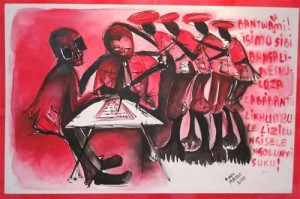
Signing of the Unity Accord - painting by Owen Maseko
by Sabelo J. Ndlovu-Gatsheni – Associate Professor of Development Studies at the University of South Africa
Introduction
I think the best way to understand the present day manifestations and character of Matebeleland politics is to situate them properly historically and politically within the broader terrain of the development of the idea of Zimbabwe and the eventual configuration of the Zimbabwe nation-state. The changing nature of politics in Matabeleland is largely a response to realities and perceptions of exclusion, marginalisation and confinement to second class citizenship of Ndebele-speaking people that began in 1980. The politics that is emerging from Matebeleland region is that of protest to perceptions and realities of exclusion, marginalisation and domination. The launch of such radical formations as the Matebeleland Liberation Front (MLF) last year calling for complete secession of Matebeleland and Midlands regions from Zimbabwe is the climax of regional politics of frustration and resentment of domination.
President Robert Mugabe’s recent response to the developments taking place in the MDC led by Welshman Ncube and his seemingly overt support for Arthur Mutambara to remain as Deputy Prime Minister and refusal to swear-in Welshman Ncube as the new Deputy Prime Minister is fuelling perceptions of Ndebele-speaking leaders being unwanted and excluded from the corridors of power. It is therefore important to deploy a sober analysis that seeks to understand the motive forces behind the character of politics in Matabeleland since the 1980s. While one can get some glimpse of the core grievances from such forums as newzimbabwe.com and many others, it is equally important to situate the Matebeleland problems historically. (Read more…)
Thu, February 24 2011 » History, Human rights, Zimbabwe Review » 5 Comments




